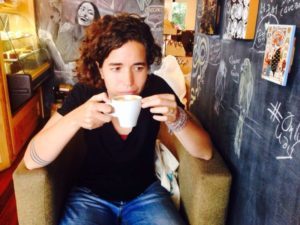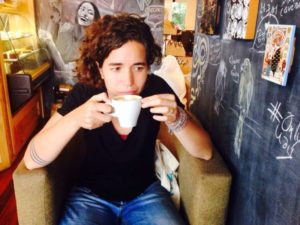 Tell me how you got started. I currently co-direct a social enterprise that works at the intersection of civic engagement, peacebuilding and technology… which I guess is also the intersection of my interests. I started off working in civic engagement: I was a student activist, then worked for the Mayor of London. While I was studying my masters, I did a short summer internship in Sudan with the UN. I think that’s when I started to understand that civic engagement and peacebuilding were similar – what we do to transform violent conflict into productive conflict.
Tell me how you got started. I currently co-direct a social enterprise that works at the intersection of civic engagement, peacebuilding and technology… which I guess is also the intersection of my interests. I started off working in civic engagement: I was a student activist, then worked for the Mayor of London. While I was studying my masters, I did a short summer internship in Sudan with the UN. I think that’s when I started to understand that civic engagement and peacebuilding were similar – what we do to transform violent conflict into productive conflict.
I ended up coming back to Sudan and working on a peacebuilding program. I’ve always loved experimenting with technology, and we used a few tools in this program. That got me thinking about the transformative role of technology in peacebuilding… which led to the Build Peace conference and eventually Build Up.
What interests you most about what you’re doing now? Earlier this year, we worked on a participatory video project on the Sudan – South Sudan border. The project supported efforts to reinvigorate cross-border economic ties, restore and improve relationships, and address divisions between the communities on both sides of the border. We’re hoping to continue working with the film-making teams there, and to take this participatory video for peacebuilding methodology to other places.
What’s been your biggest accomplishment? Probably co-creating the Build Peace conference and the community that is emerging around it. And I use co-creating deliberately, it’s certainly not something I did alone.
Biggest challenge? Finding ways to measure the impact of the peacebuilding work we’re involved in. I am yet to find a metric of peace that is reliable, ground-truthed and feasible to measure.
Who or what inspires you? Local peacebuilders and local activists alike. People who see clearly what needs to change in their society, and find non-violent, constructive ways to work for change. I’m especially inspired by activists that manage to do their work with creativity and good humor. Like the Occupy Buffer Zone peace activists in Cyprus who came up with the slogan “Hey UN, you probably don’t know this, but we’re trying to help” as a response to peacekeepers trying to evict them. Or the local activists who staged a flamenco-protest at one of Spain’s failing banks during the financial crisis. Or the public health advocate who loves being called Mr. Toilet.
Why is peace sexy to you? What does “Peace is Sexy” evoke for you? I actually don’t think peace is sexy. I think war is sexy, it’s made sexy in our prevalent societal discourses. That might be our greatest challenge as peacebuilders.
There’s a book I love called “A Terrible Love of War“. It lays out the reasons – poetic, philosophical and psychological – why people love war. I can’t do the book justice in a few sentences, but in essence it’s all about finding a sense of purpose. War gives people a sense of purpose, and that’s why soldiers show up to war. You might find that outrageous: don’t soldiers show up to war as a result of some combination of extortion, violence and economic forces. Yes, that is the story of many. But we have to admit that people also choose war, and that these people are not so different from you and me. So why do they (we) do it? Only if we understand this terrible love of war compassionately can we begin to build a love of peace.
What is a simple thing you do to create peace? What is something you do everyday? I try to listen and cultivate patience. Maybe that’s a cliché, but I’m pretty convinced that active listening is at the heart of building peace. You’ve got to be willing to constantly challenge your perspective by really listening to what other say, which can be quite a vulnerable place to be.
How would you like Peace is Sexy to make a difference in what you are up to? We’d love it if you encourage your readers to attend the Build Peace conference!
Where would you like to see your passion go in the next 10 years? 20 years? 100 years? In the next 10 – 20 years, I hope more local peacebuilders will connect with technologists to build the kind of peacetech initiatives that can increase the impact of peacebuilding work. I hope local activists use tech to make peace sexy by challenging the narratives that currently make war sexy. And in the next 100 years? I’d love it if nobody talked about peacebuilding. If we saw conflict as change and talked about transforming together.

